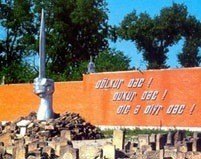 |
Vol 1, No 24
6 December 1999 |
|
|
Chechnya: An Honorary Baltic State Mel Huang Throughout the last decade, Estonia, Latvia and Lithuania have been the strongest international supporters of Chechnya - much to the ire of Russia. Remembering their own struggles against Moscow, many former freedom fighters in the Baltics view the recent conflict as another example of Russian aggression against a small nation. The situation in Chechnya evokes parallels with Soviet atrocities committed in the Baltics during the occupation; thus, the Chechen cause has gained many supporters throughout the three countries. Though most of the public is vehemently opposed primarily to the campaign against civilian targets and innocents in Chechnya, there are also a number of people who support Chechen independence outright. Many in Estonia still credit the late Chechen President, Dzhokhar Dudayev, with preventing bloodshed in Estonia during the Singing Revolution. At that time, Dudayev commanded a Soviet military division in Tartu, and at the end of the day, there was no public bloodshed, which was not the case in Latvia and Lithuania. Former freedom fighters such as Seimas (Lithuanian Parliament) Speaker Vytautas Landsbergis have made Chechnya into a personal cause, as have many others. Since the renewed outbreak of war between Chechen forces and the Russian military several months ago, the Balts have also reappeared on the scene as supporters of Chechnya and critics of Russian military adventurism. When news broke of massive Russian air bombardment of Chechen cities and the ensuing humanitarian catastrophe, the public became more agitated. Protests began in all three Baltic capitals, usually targeted at the local Russian embassy. At some protests, usually led by students, signs appeared calling Russian Premier Vladimir Putin a "war criminal" and telling Russia to "keep out" of Chechnya. At other protests, politicians, such as Latvian parliamentarian Juris Vidins (of the For Fatherland and Freedom party), were leading the charge. Other embassies, such as those of the US, Britain and Turkey, have also been targets due to what is perceived as their passivity on the issue. At the same time, Russia has stepped up its criticism of the Baltic states. As usual, the Russian Foreign Ministry issued harsh attacks on the Balts for voicing their opinions on Chechnya, always reverting to the "it is our internal affair" argument. Russian military officials even hinted at the number of Estonian, Latvian and Lithuanian mercenaries fighting with the Chechens. And the familiar rumours of the "White Pantyhose Brigade" returned. Every so often, Russian military officials issue statements about the blond-haired female sharpshooters and snipers from the Baltics active against the Russian military, re-iterating the old Russian stereotype of Balts as the only natural blondes in the former Soviet space. The situation intensified, of course, after several Latvians went on television saying they want to volunteer in Chechnya to fight against Russia. The harshest official criticism against the Russian campaign came in connection with the OSCE Summit in Istanbul during the third week of November. First, Estonian President Lennart Meri publicly boycotted the Summit, stressing that the OSCE should, at a time like this, be acting instead of celebrating. This enabled Prime Minister Mart Laar to deal the harshest public criticism against Russia yet. Laar, in Istanbul, called the campaign to "demonise" the Chechen nation "racist, pure and simple." Laar's harsh attack on the Russian military campaign earned a similarly harsh rebuttal from the Russian Foreign Ministry. Lithuanian President Valdas Adamkus and Latvian Prime Minister Andris Skele also launched stern criticism against the Chechen attack in Istanbul. Several thousand people in Lithuania have apparently also signed a petition entitled "The shame of European civilisation and felonious inactivity of politicians with respect to the Chechen nation." However, in all this there is one very worrying trend that already materialised earlier this year during the NATO campaign in Kosovo: the opposing opinions of the Baltic states' Russian-speaking communities. During the Kosovo conflict, the opinions of Russian-speakers were significantly different from those of the indigenous population. This was primarily due to the fact that many of them view television programming from Russia rather than from local sources. Unfortunately, because of national pride, local media outlets in the three countries have failed to create credible Russian-language media, and this has forced the Russian-speaking communities to get their news from sources such as ORT in Russia. With the selective and propaganda-heavy reporting by Russian media on both the Kosovo and Chechen crises, it is clear why the opinions of the Baltic Russian-speaking communities correlate with those within Russia. The most startling difference of opinion can be seen in young people. The public finally began to notice after a shocking revelation in the Estonian daily Postimees on 11 November, in which secondary-school graduates from both Estonian-language and Russian-language schools were asked their views on Chechnya. Here are some examples of what Estonian-school graduates said:
And here a few comments from Russian-language secondary school graduates:
Most of the comments from the Russian-speaking graduates seem horrific and brutal, but if one watches Russian TV, one sees that this very much represents normal public opinion in the country. However, the last quote does give some hope. As long as the Balts view Chechnya as a small nation struggling for independence against mighty Russia, there will be sympathy for its cause. After all, the Balts have experienced what Chechnya is currently going through. However, the reaction to the conflict should also be a lesson to the authorities in Vilnius, Riga and Tallinn that the harsh opinions of those relying on Russian media will continue to hinder NATO integration. Perhaps if the situation becomes serious enough, officials will realise that unbiased Russian-language media sources in the three countries would be a better idea than remaining on one's high horse. Mel Huang, 2 December 1999 Archive of Mel Huang's Amber Coast articles
|
|
![]()
Copyright (c) 1999 - Central Europe Review and Internet servis, a.s.
All Rights
Reserved
